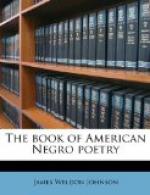Phillis Wheatley has never been given her rightful place in American literature. By some sort of conspiracy she is kept out of most of the books, especially the text-books on literature used in the schools. Of course, she is not a great American poet—and in her day there were no great American poets—but she is an important American poet. Her importance, if for no other reason, rests on the fact that, save one, she is the first in order of time of all the women poets of America. And she is among the first of all American poets to issue a volume.
It seems strange that the books generally give space to a mention of Urian Oakes, President of Harvard College, and to quotations from the crude and lengthy elegy which he published in 1667; and print examples from the execrable versified version of the Psalms made by the New England divines, and yet deny a place to Phillis Wheatley.
Here are the opening lines from the elegy by Oakes, which is quoted from in most of the books on American literature:
“Reader, I am no poet, but
I grieve.
Behold here what that passion
can do,
That forced a verse without
Apollo’s leave,
And whether the learned sisters
would or no.”
There was no need for Urian to admit what his handiwork declared. But this from the versified Psalms is still worse, yet it is found in the books:
“The Lord’s song sing can we? being in stranger’s land, then let lose her skill my right hand if I Jerusalem forget.”
Anne Bradstreet preceded Phillis Wheatley by a little over twenty years. She published her volume of poems, “The Tenth Muse,” in 1750. Let us strike a comparison between the two. Anne Bradstreet was a wealthy, cultivated Puritan girl, the daughter of Thomas Dudley, Governor of Bay Colony. Phillis, as we know, was a Negro slave girl born in Africa. Let us take them both at their best and in the same vein. The following stanza is from Anne’s poem entitled “Contemplation”:
“While musing thus with contemplation
fed,
And thousand fancies buzzing
in my brain,
The sweet tongued Philomel
percht o’er my head,
And chanted forth a most melodious
strain,
Which rapt me so with wonder
and delight,
I judged my hearing better
than my sight,
And wisht me wings with her
awhile to take my flight.”
And the following is from Phillis’ poem entitled “Imagination”:
“Imagination! who can sing
thy force?
Or who describe the swiftness
of thy course?
Soaring through air to find
the bright abode,
The empyreal palace of the
thundering God,
We on thy pinions can surpass
the wind,
And leave the rolling universe
behind,
From star to star the mental
optics rove,
Measure the skies, and range
the realms above,
There in one view we grasp
the mighty whole,
Or with new worlds amaze the
unbounded soul.”




